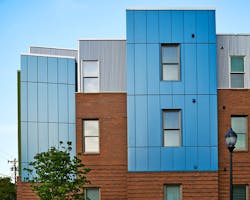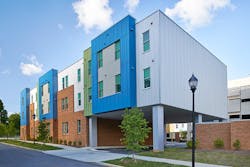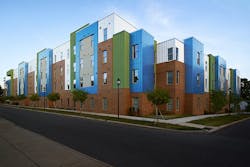Charlotte’s Mosaic Village merges jazz and architecture
The Northwest Corridor Revitalization Initiative brings together businesses, residents, city authorities, developers, and officials from Johnson C. Smith University (JCSU) to boost the quality of life and economic activity of the Northwest Corridor, a major transportation route from uptown Charlotte, N.C. JCSU opened the vibrant Mosaic Village in the historic West End in 2012 as an important aspect of the revitalization project.
The 124,000-sf mixed-use project contains 80 apartments, accommodating 300 students with numerous amenities. Tenants have access to a gym, computer lab, study rooms, lounges, and a 4,000-sf rooftop terrace. A free shuttle brings riders to the main university campus and uptown Charlotte. Mosaic Village contains 7,500 sf of retail space and was designed to attract new businesses that benefit from this high-density housing. The project strives to promote identity, history, and diversity.
Architect Daniel McNamee was inspired by the neighborhood's rich jazz history and the nearby Excelsior Club, which had at one time been the largest private social club for Black professionals in the Southeast.
“The primary challenge was to take a residence hall—a building type that typically has a lot of overbearing repetition—and compose a dynamic design that tells the story of the historic West End through a connection with jazz music,” said McNamee.
The dynamic and inspiring exterior of Mosaic Village contains a brick façade, with metal panels at varying depths. The panels provide both insulation and a crisp look. They are coated with Valspar's 70% PVDF Fluropon coating in Cool Breakwater Blue and Silversmith, bringing the project to life and providing exceptional protection again the elements.
These dynamic elements helped the project win AIA Charlotte’s Urban Design Merit Award and become a neighborhood favorite, revitalizing the historic neighborhood.
About the Author

Jeff Alexander
Jeff Alexander, Sherwin-Williams Coil Coatings VP of Sales for the Coil and Extrusion division has been with Sherwin-Williams (formerly Valspar) since 1997. He has an entrepreneur spirit and has thrived in building relationships with our customers. Jeff has fully immersed himself in all levels of the coating industry and enjoyed his term as National President at NCCA (National Coil Coating Association). He is focused on continuing to educate customers on the paint industry.



